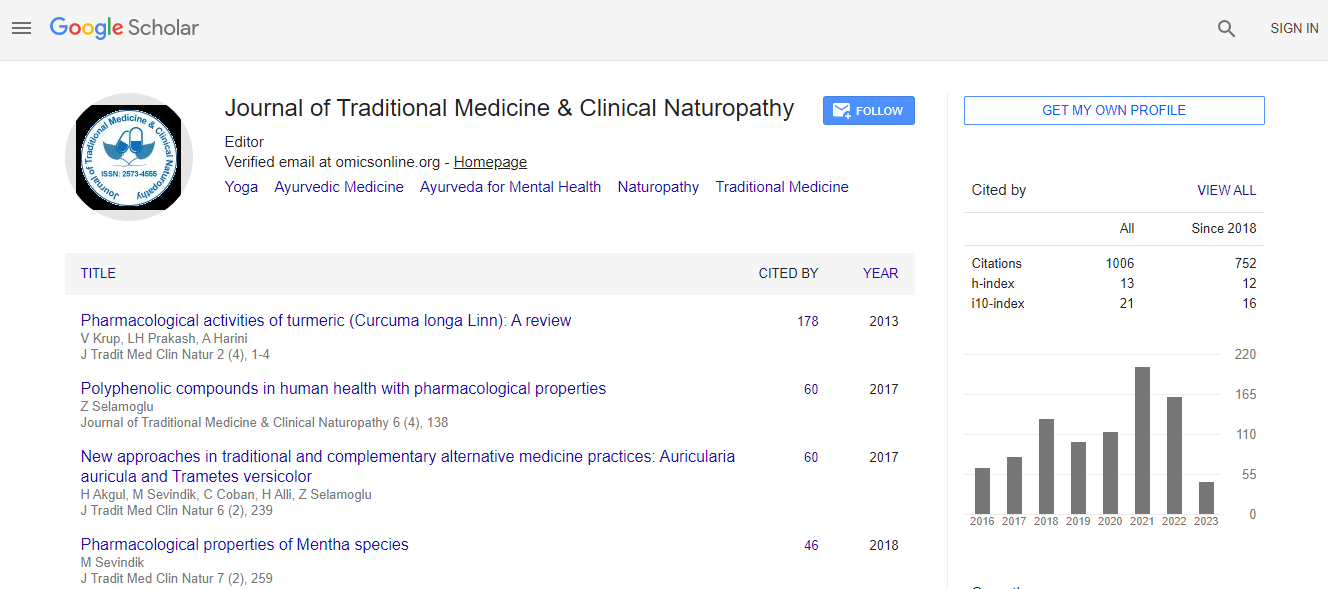Our Group organises 3000+ Global Conferenceseries Events every year across USA, Europe & Asia with support from 1000 more scientific Societies and Publishes 700+ Open Access Journals which contains over 50000 eminent personalities, reputed scientists as editorial board members.
Open Access Journals gaining more Readers and Citations
700 Journals and 15,000,000 Readers Each Journal is getting 25,000+ Readers
Google Scholar citation report
Citations : 1504
Journal of Traditional Medicine & Clinical Naturopathy peer review process verified at publons
Indexed In
- CAS Source Index (CASSI)
- Google Scholar
- Sherpa Romeo
- Open J Gate
- Genamics JournalSeek
- RefSeek
- Directory of Research Journal Indexing (DRJI)
- Hamdard University
- EBSCO A-Z
- Publons
- Geneva Foundation for Medical Education and Research
- Euro Pub
- ICMJE
Useful Links
Recommended Journals
Related Subjects
Share This Page
Predictive binding affinity of plant-derived natural products towards the protein kinase G enzyme of Mycobacterium tuberculosis
Joint Meeting on 2nd World Congress on Traditional & Complemenatry Medicine & 2nd International Conference on Herbal & Traditional Medicine
Rana M Qasaymeh, Dino Rotondo and Veronique Seidel
University of Strathclyde, UK
Posters & Accepted Abstracts: J Tradit Med Clin Natur
Abstract
Tuberculosis (TB) caused by Mycobacterium tuberculosis is a growing public health concern worldwide, especially with the emerging challenge of drug resistance to the current drugs. Efforts to discover and develop some novel, more effective and safer anti-TB drugs are urgently needed. Products from natural sources, such as medicinal plants have long played an important role in traditional medicine and continue to provide some inspiring templates for the design of new drugs. Protein kinase G, produced by M. tuberculosis (MtPKnG), is a eukaryotic-like serine/threonine kinase that has been reported to prevent phagosomelysosome fusion and help prolong M. tuberculosis survival within the host’s macrophages. Here, we used an in silico target-based approach (docking) to predict the interactions between MtPknG and 84 chemical constituents from two medicinal plants (Pelargonium reniforme and Pelargonium sidoides) that have a welldocumented historical use as natural remedies for TB. Docking scores for ligands towards the target protein were calculated using AutoDock Vina as the predicted binding free energies, with the lowest score indicating the highest ligand/protein affinity. The scores obtained ranged between -5.8 and -13.2 kcal/mol. The flavonoid derivatives (isoorientin 2”-O-gallate and isovitexin 2”-O-gallate) present in P. reniforme/sidoides aerial parts displayed the best binding affinity towards MtPknG (-13.2 and -12.6 kcal/mol), with docking scores superior to the control inhibitor AX20017 (-7.9 kcal/mol). The observation of the predictive binding affinity of these natural products towards MtPknG warrants further in vitro investigations as they could represent some chemical scaffolds for the design of new MtPknG inhibitors.Biography
Rana M Qasaymeh is currently pursuing her PhD at the Starthclyde Institute of Pharmacy and Biomedical Sciences, University of Strathclyde, UK.
E-mail: qwb17191@strath.ac.uk

 Spanish
Spanish  Chinese
Chinese  Russian
Russian  German
German  French
French  Japanese
Japanese  Portuguese
Portuguese  Hindi
Hindi 
